Social media is a lot of work: you have to create, schedule, approve, and distribute content, not to mention analyze its performance afterward. You can do it all manually, but once you have more than one or two accounts, you’re in for many headaches. Social media tools have your back during day-to-day operations, making everything less of a hassle and more effective.
Using the right social media tools is like having an extra pair of hands to make social media management so much easier. So, here are some proven social media tools that can help you streamline your processes and create content at scale without sacrificing quality.
What to look for in social media marketing tools
Social media tools can significantly enhance your everyday work on social media, from campaign management to performance analysis and audience engagement.
When choosing social media tools, consider:
Ensure your social media tools of choice have seamless integration with social platforms and other tools you use.
Look for user-friendly tools that don’t require hours of onboarding either from you or your clients.
Opt for social media management tools that facilitate easy collaboration among team members.
Prioritize tools with robust reporting and analytics capabilities to track your progress and make data-driven decisions.
Choose social media tools that automate repetitive tasks to save time and reduce errors.
Social media tools for content creation and scheduling
1. Planable – best social media tool for collaboration, approvals, and scheduling
Planable is the ultimate social media tool that makes running multiple social media accounts much easier and more efficient. Planable’s trump card is seamless collaboration when it comes to social media content management.
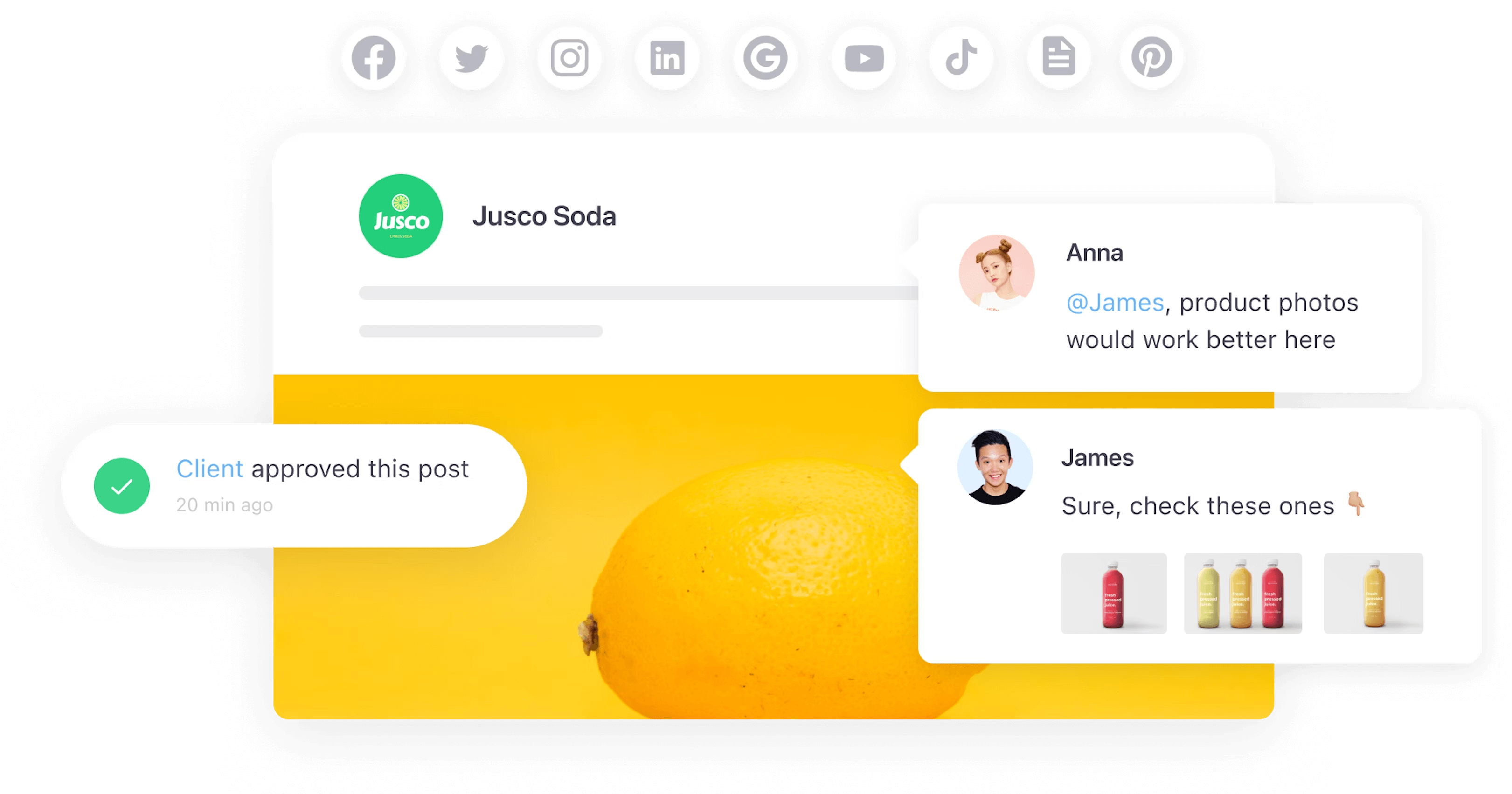

Collaboration and approval in Planable
Planable allows you to create dedicated workspaces, making it ideal for marketing teams and agencies working with multiple brands or clients across diverse platforms. In each workspace, you’re free to set custom approval workflows to speed up content down the pipeline, set specific roles, and connect the required channels.
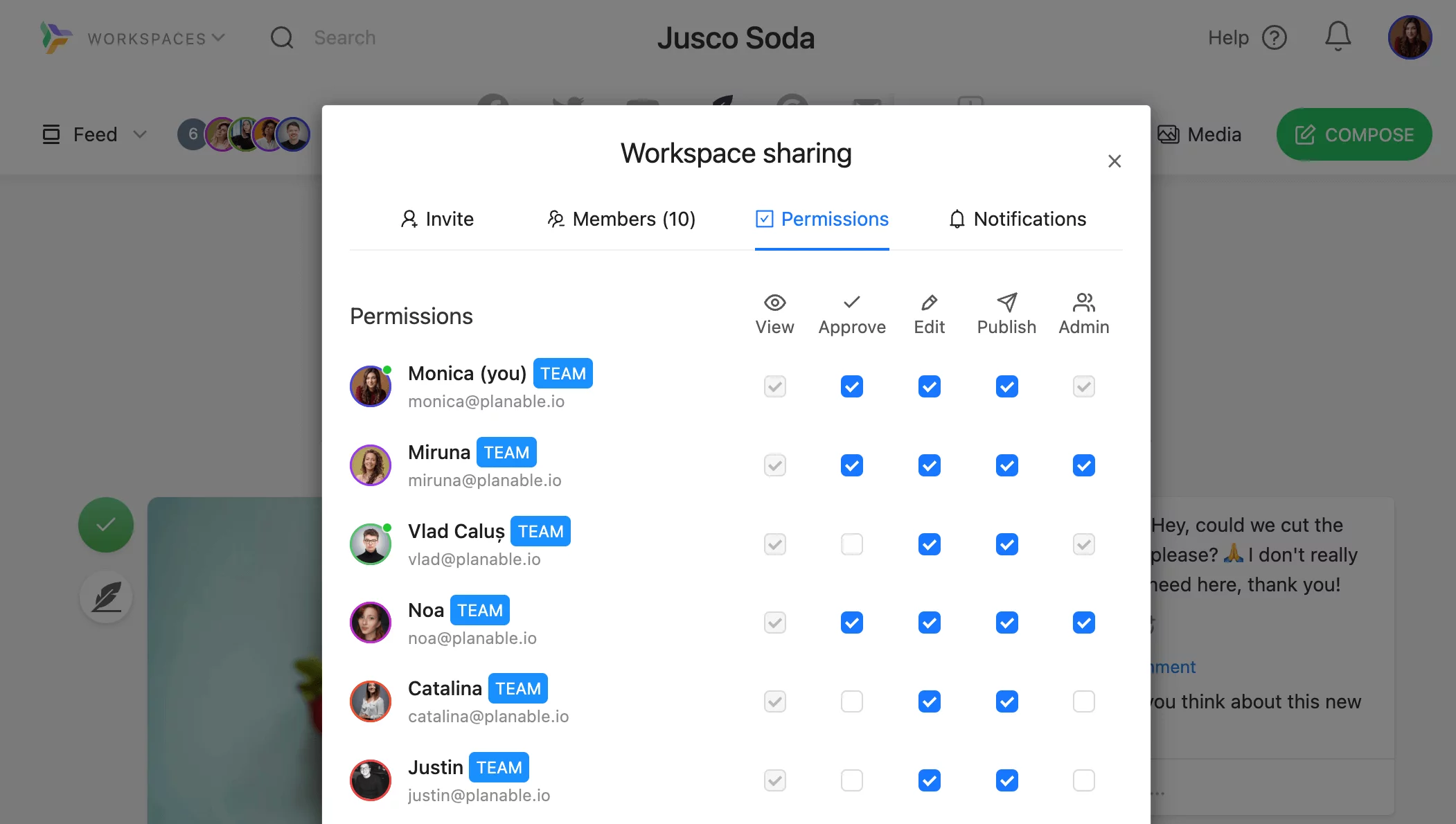

Workspace permissions in Planable
You get four options when it comes to the approval workflow. They span from none, for solo acts who don’t need approval from others before posting, all the way up to multi-level.
Anyone invited to your workspace can be granted approval permissions, including external collaborators such as subject matter experts from other teams, or client stakeholders.
The multi-level approval option is the stand-out feature here. Perfect for teams who need approval on content at different stages, or for agencies who run internal approvals before presenting work to the client for the final go-ahead.
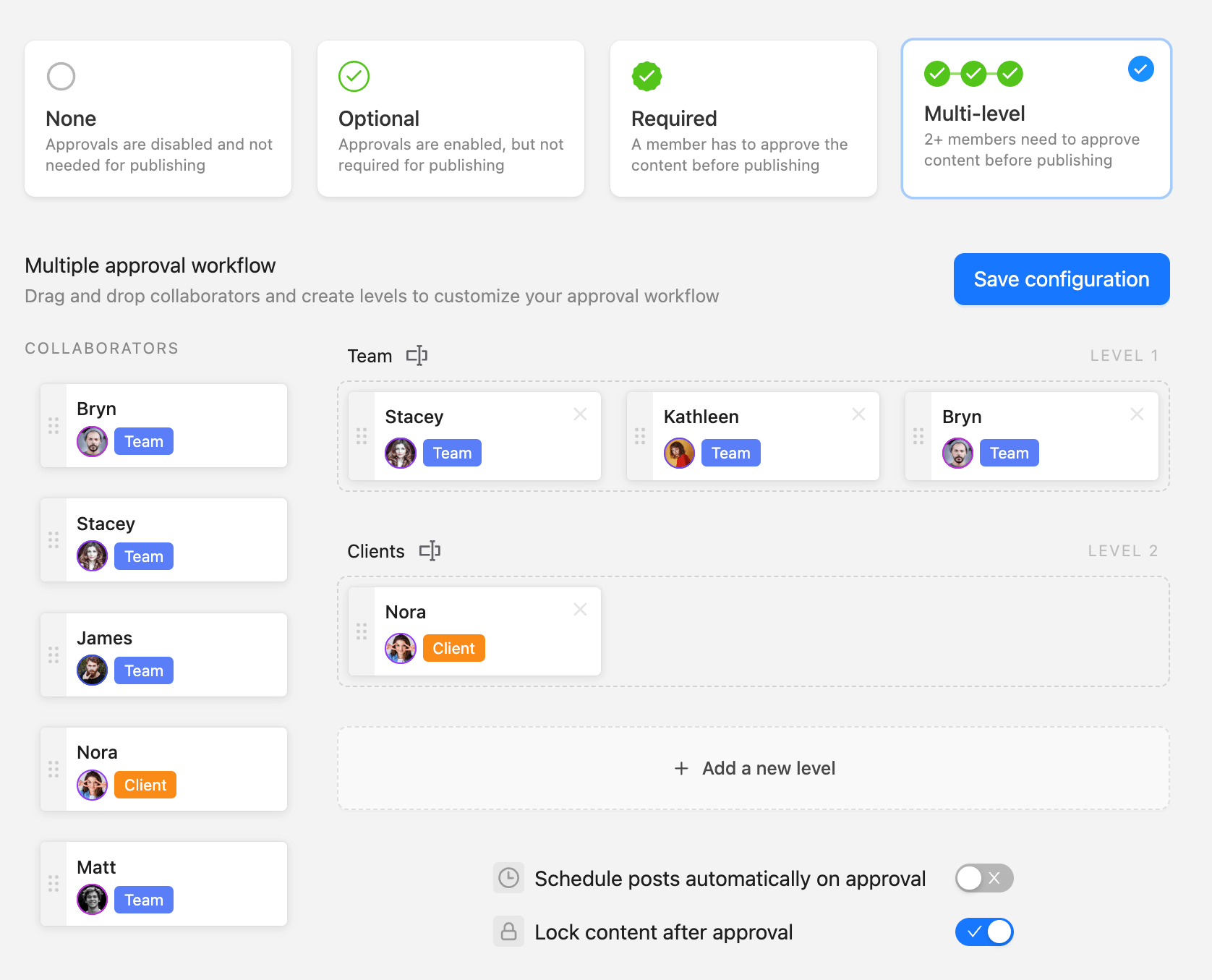

Multi-level approval flow in Planable
I love how you can see mockup previews of exactly how your posts will look in Planable’s feed view. It helps your team and any other stakeholders to understand the full context of the content while providing feedback or issuing approval.
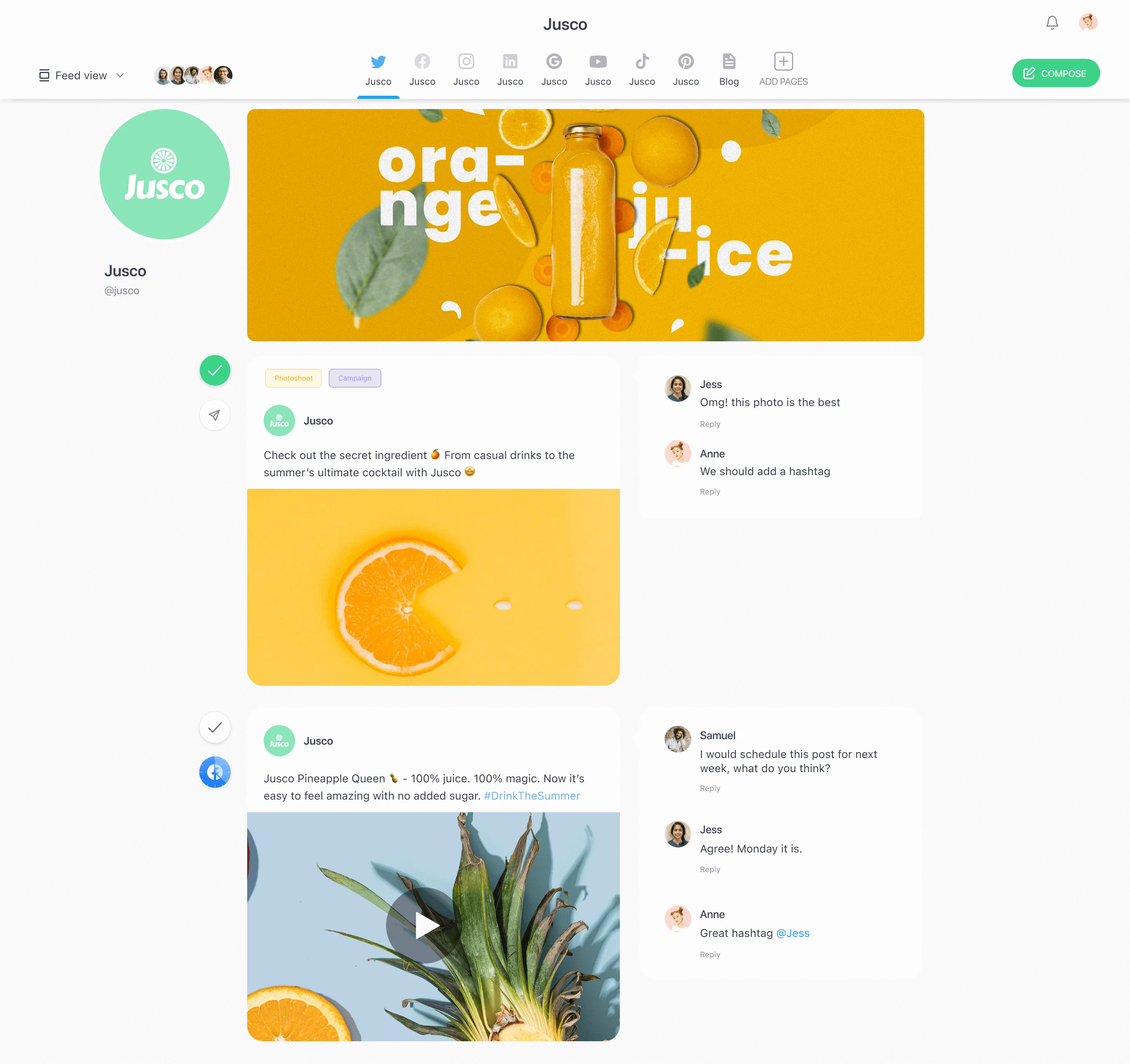

Mockup post previews in Planable’s feed view
With Planable, you can schedule and automatically publish content to any major social media platform directly from the calendar view. Facebook posts, Instagram Reels, YouTube videos, LinkedIn PDF carousels — schedule all your content to go live, regardless of the format.
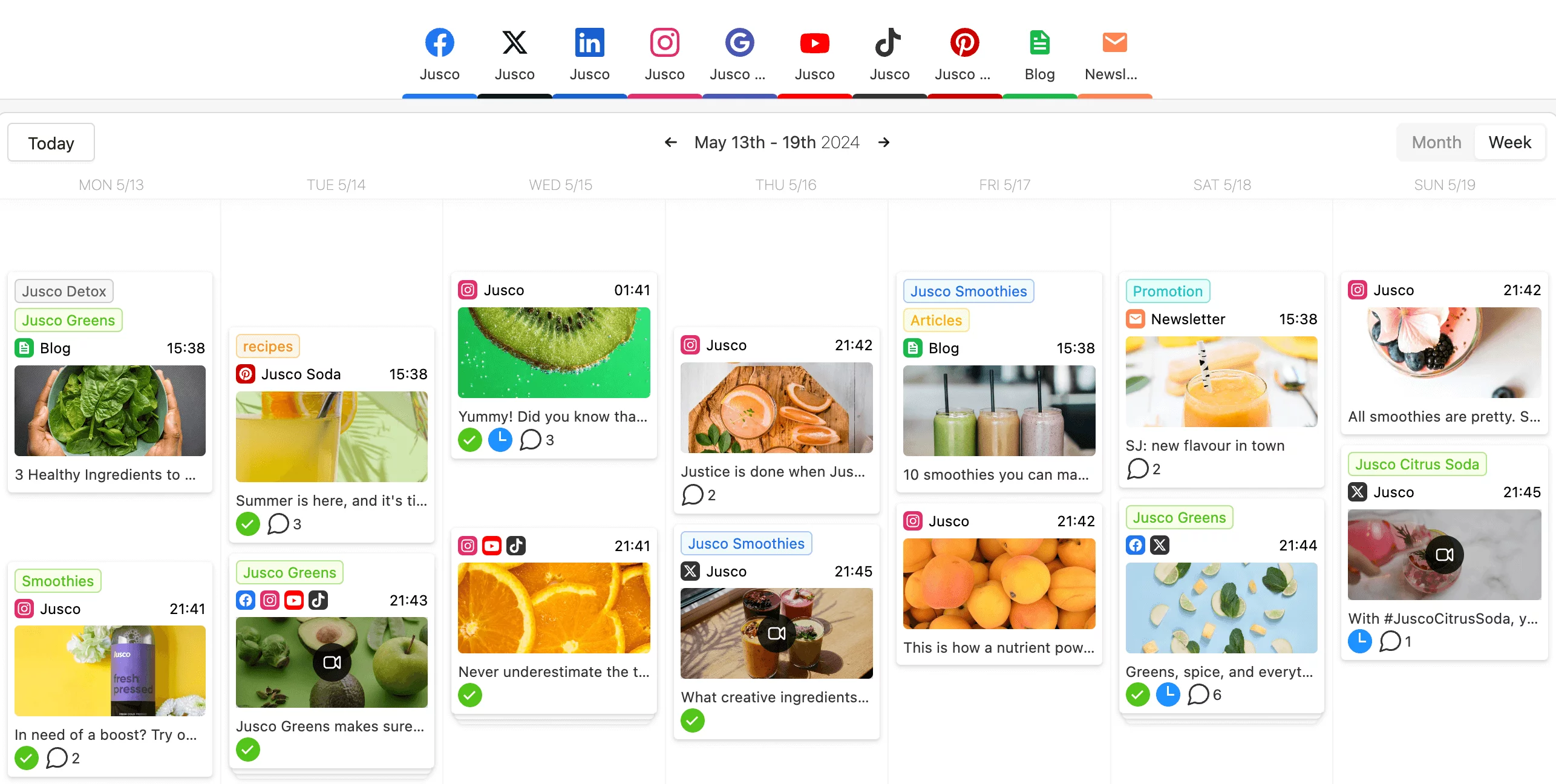

Social media calendar view in Planable
Beyond social media, Planable supports other content types like blog articles, newsletters, briefs, and video scripts through its Universal Content feature, making it one of the few social media tools that cover all your content needs.
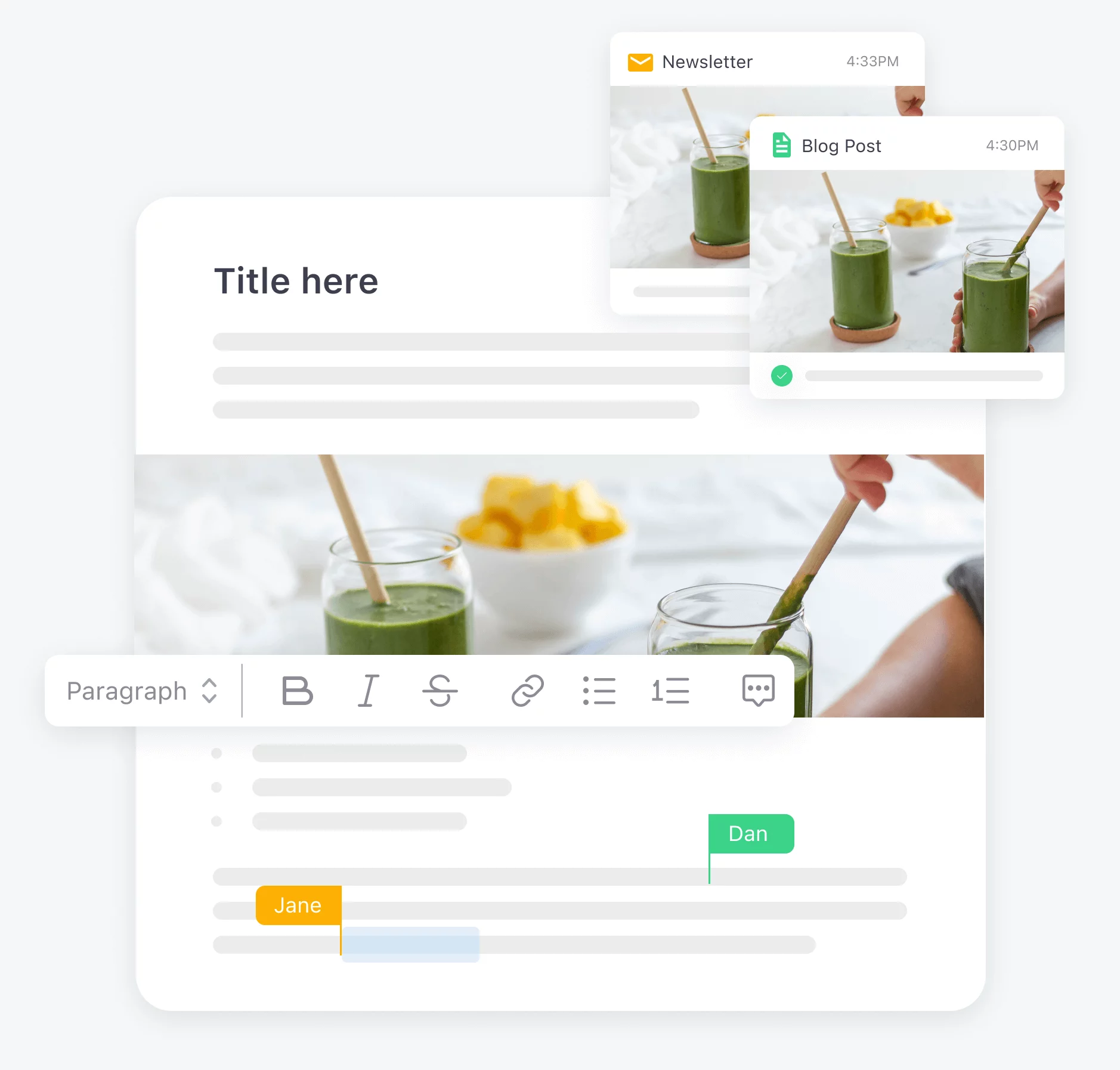

Key features
- Collaboration features. Exchange immediate feedback, set up custom approval workflows, assign different roles, and create dedicated workspaces for each client.
- Social media content calendar. Visually plan and schedule content across multiple social platforms. Planable offers four views: calendar, list, feed, and grid, so you can see how your post will look in your account.
- Built-in editor. Edit images and videos directly within Planable using tools for cropping, filters, and text annotations.
- Analytics. Track the performance of your content to optimize social media strategies and make data-driven decisions.
Drawbacks: Planable doesn’t have social listening features.
Pricing: Planable offers 50 free posts to try the platform first-hand. After that, you can choose a plan befitting your needs in terms of workspaces, users, and features. The upgrade starts at $11/month per user.
2. Canva – best for creating social media visuals
Canva is a user-friendly tool for designing visual content for social media and beyond. Its simple drag-and-drop interface makes it easy for anyone to produce professional-quality graphics for various social media channels.
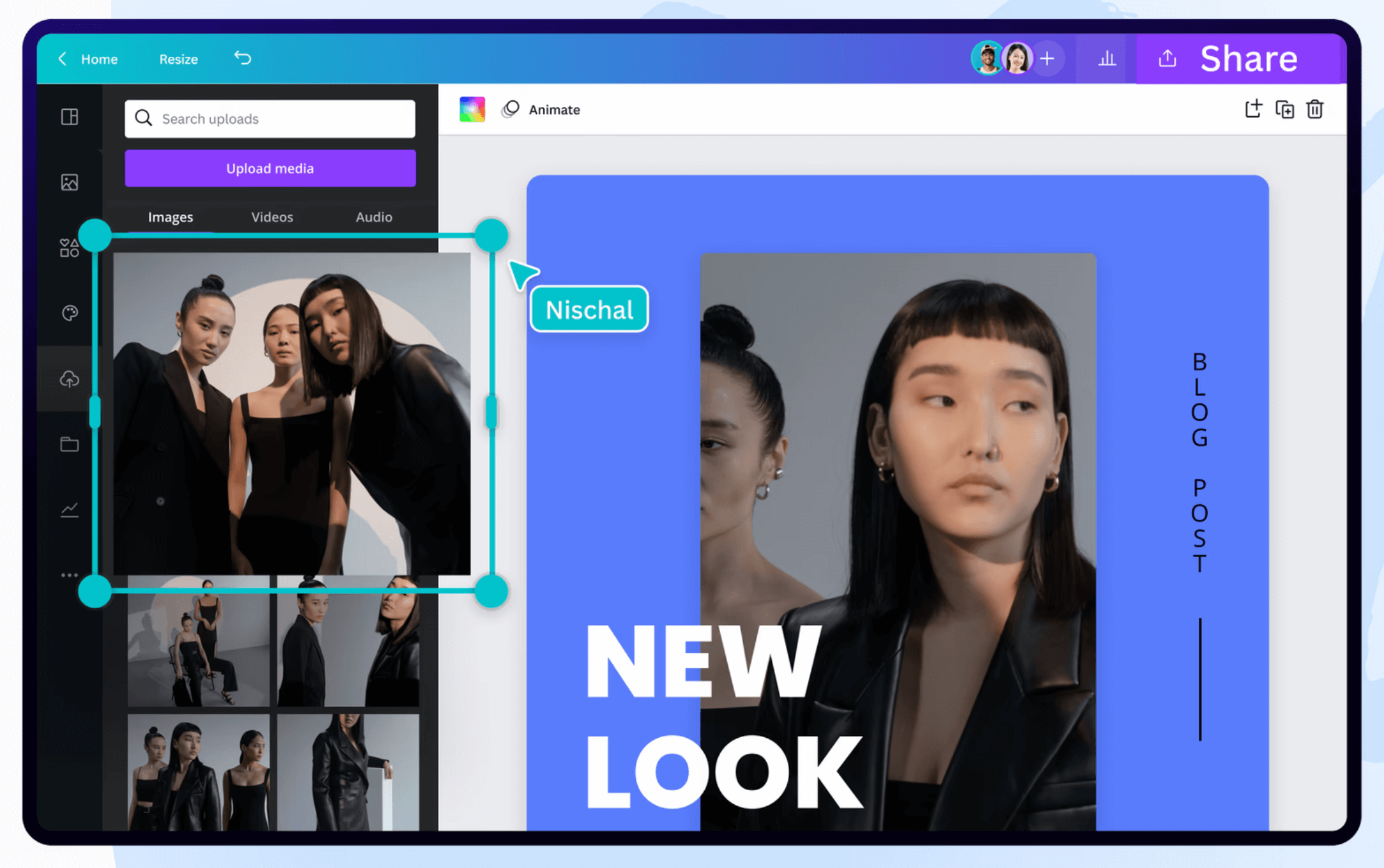

At the risk of making a lot of designers very angry, I can say that Canva is a solid option for social media teams that don’t have a dedicated designer.
Key features
- Template library. Canva offers thousands of customizable templates tailored for different social media platforms, making it easy to create eye-catching posts, stories, and ads.
- Brand kit. Maintain brand consistency by storing your brand’s colors, fonts, and logos in one place, ensuring every design aligns with your brand identity.
- AI tools. Use AI-powered features like the background remover, magic eraser, and more to remove any stubborn element from your pitch-perfect picture.
Drawbacks: Canva is simple, so its features might be insufficient for more elaborate designs.
Pricing: Canva has a robust free plan and two paid plans starting at $12/month.
3. SocialPilot – best scheduling tool with social inbox
SocialPilot is a social media tool for managing content across various social channels. Its remarkable feature is a unified social inbox that helps you keep all your DMs, mentions, and comments tidy and taken care of timely.
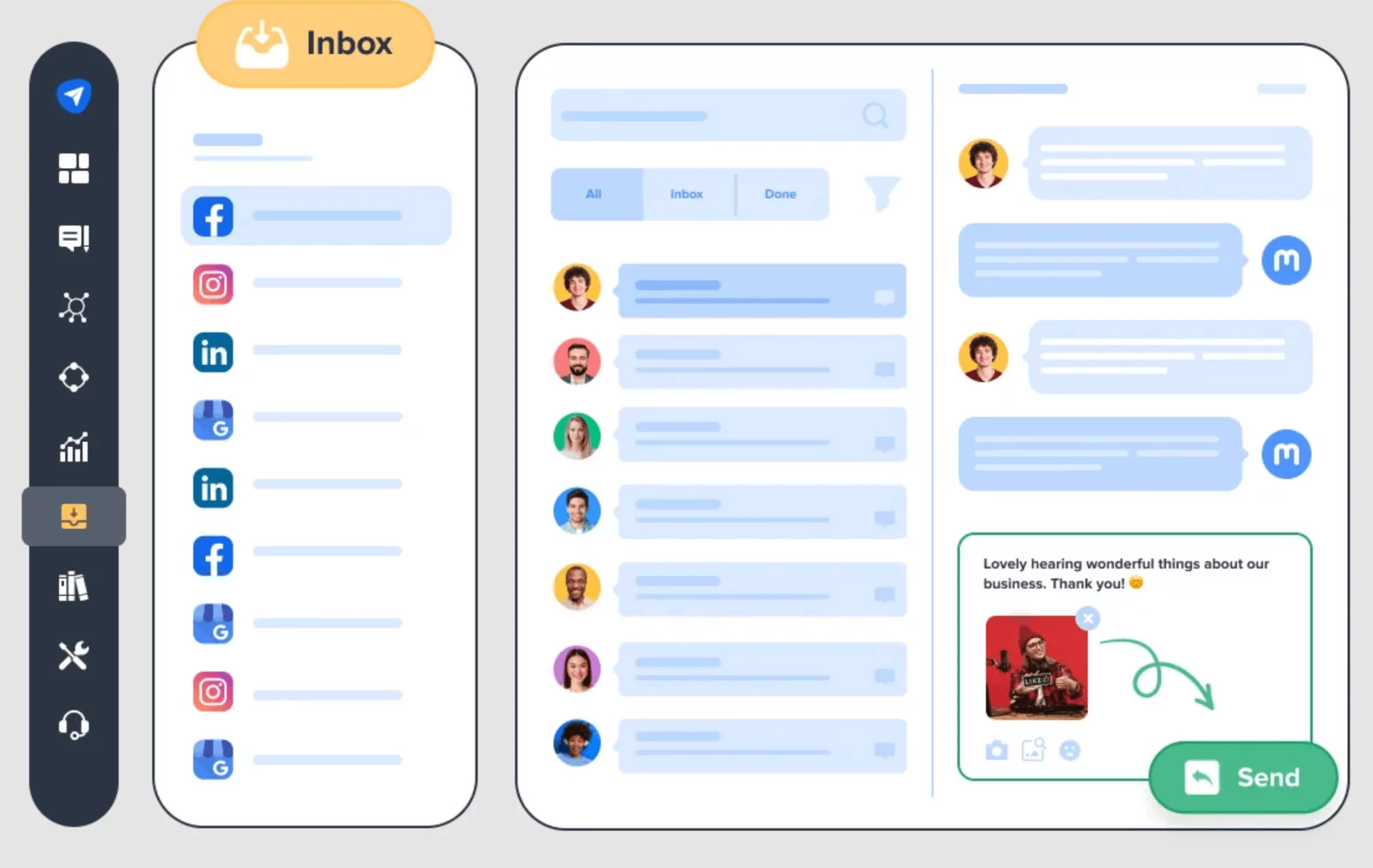

There are also some collaboration features in the mix, allowing you to draft posts together with your team.
Key features
- Multi-platform scheduling. SocialPilot supports scheduling for major channels like Facebook, Twitter, LinkedIn, Instagram, TikTok, Google My Business, YouTube, and Pinterest, allowing you to manage all your accounts from a single dashboard.
- Team management. Set up role-specific permissions and internal workflows to create polished social campaigns as a team. Leverage built-in approvals to truly rock your content curation.
- Unified social inbox. Monitor brand mentions and reply to comments and DMs on multiple platforms from one place, enhancing your social media engagement and customer service.
Drawbacks: Compared to other social media tools on this list, SocialPilot has limitations, such as lacking social media listening features and detailed Instagram analytics.
Pricing: SocialPilot has four paid plans starting at $30/month.
4. Planable – best social media tool for real-time collaboration
Collaboration is the very heart of Planable, making it one of the best social media tools for teams who want to leverage their collective creativity. Planable helps you craft outstanding social media posts together with your team and clients, speeding up content creation, feedback exchange, and approvals.
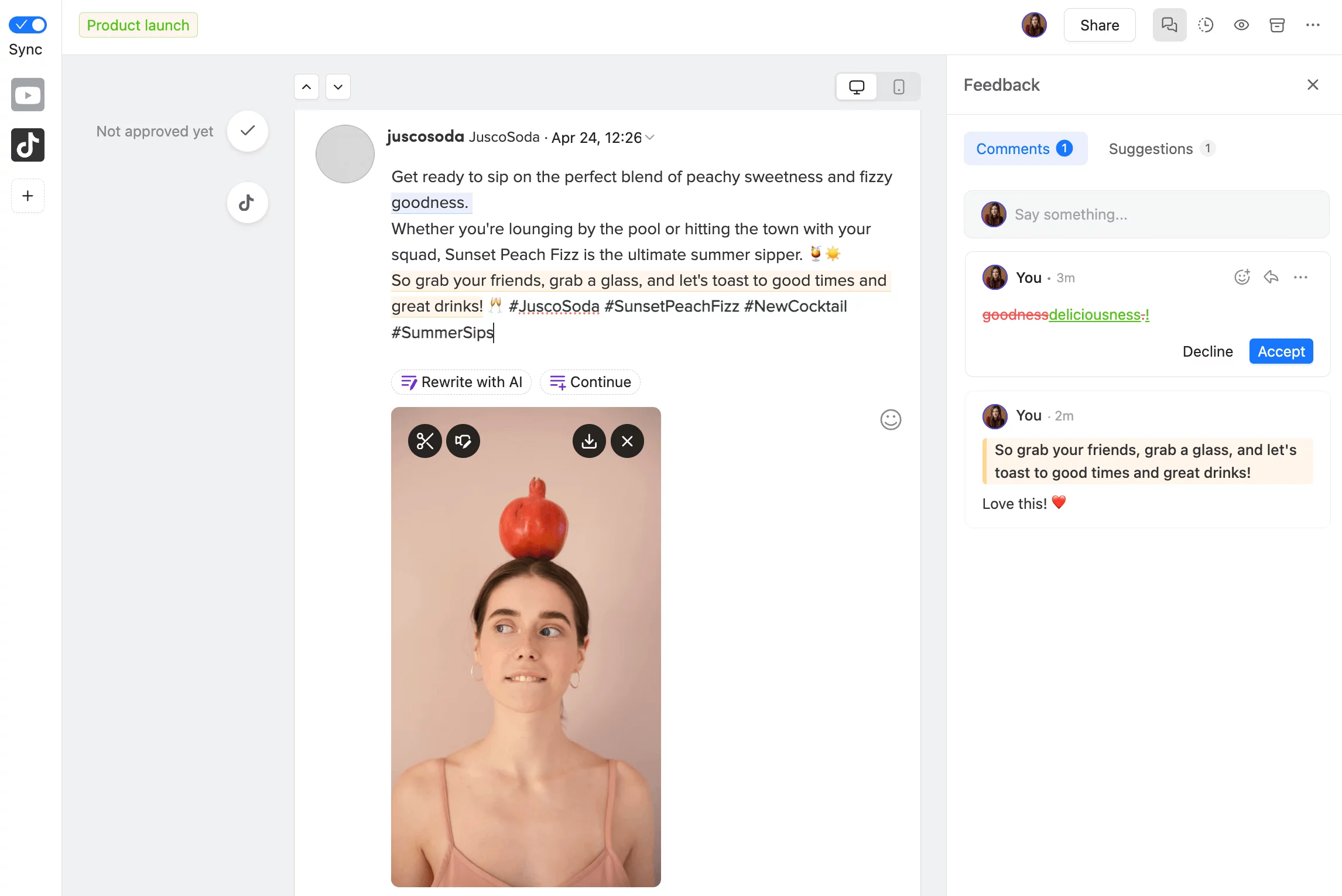

Collaboration on a TikTok post in Planable
My favorite thing about Planable’s collaboration workflow is that it’s very thought-through and easy to get a grip on. The onboarding is very smooth, leaving little to no chance of doing things wrong.
And even if you did make an error or simply decided to go back on your content, you can always revert changes, thanks to the post-activity history.
Key features
- Custom approval workflows. You can set up your approval process the way you want, from no checks needed to multi-layered approval flows. Planable can also automatically schedule a post to go live once approved.
- In-context feedback. Leave real-time comments, suggestions, and annotations on social media posts, images, and videos to let your colleagues know exactly what needs polishing.
- Roles and permissions. Divide creators from approvers by setting roles within your workspace. Leverage this to create internal notes visible only to your teammates or hide drafts from curious clients.
Drawbacks: Planable has multiple collaboration tools but no project management tool like a task tracker.
Pricing: Planable offers 50 free posts. After that, you can upgrade for $11/month per user.
When it comes to collaboration and approvals, Planable is a fantastic alternative to Sked Social and other social media management tools for agencies.
5. HubSpot – best for internal marketing team collaboration
HubSpot is a robust all-in-one platform that enhances team collaboration through its integrated CRM and suite of marketing tools.
HubSpot has solutions for content marketing, social media management, sales, marketing automation, and customer support. These tools can work separately or together, integrating through HubSpot CRM.
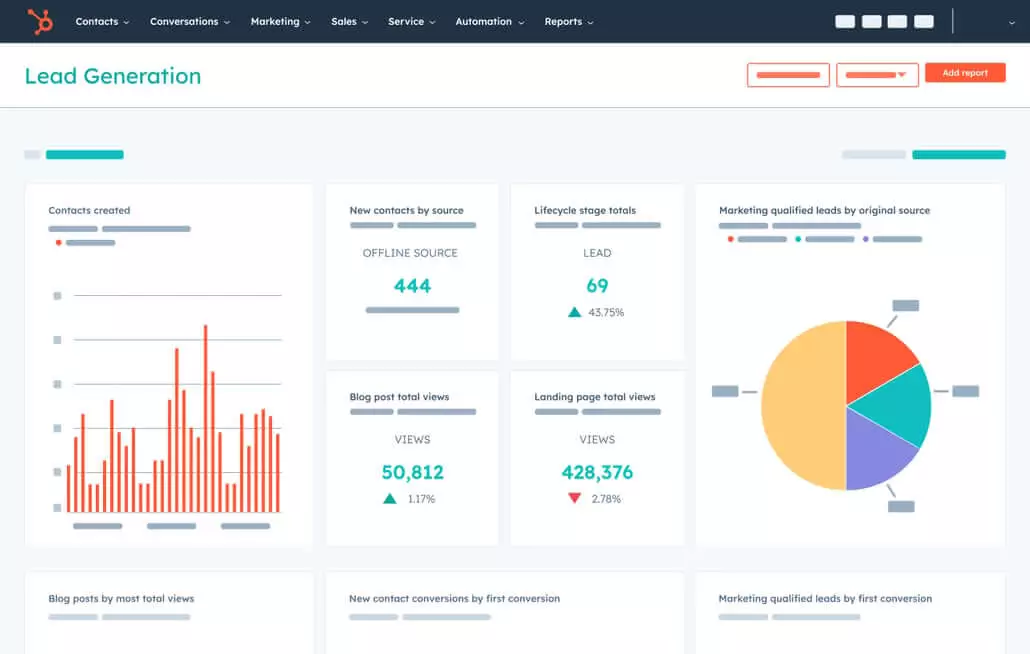

Such an extensive ecosystem helps marketing teams sync between branches and trace the customer’s journey through the whole funnel, ensuring a cohesive marketing strategy at every stage.
Key features
- Social media management tools. Schedule posts, gather analytics, and monitor social media performance across various channels to optimize your social media strategy and overall marketing approach.
- Content remix. Repurpose content across different channels, transforming blog posts into social media updates and vice versa, maximizing the reach and impact of your content.
Drawbacks: HubSpot is a solution for big companies with branched-out extensive marketing teams. It would be total overkill for a small agency or in-house social media marketer who only needs basic social media tools.
Pricing: HubSpot’s CRM is free. Each Hub (Content, Service, Marketing, etc.) is billed separately. A basic bundle of all Hubs starts at $20/month.
6. Sendible – best for agency-client collaboration
Sendible positions itself as a social media tool for agencies, emphasizing seamless collaboration with external clients.
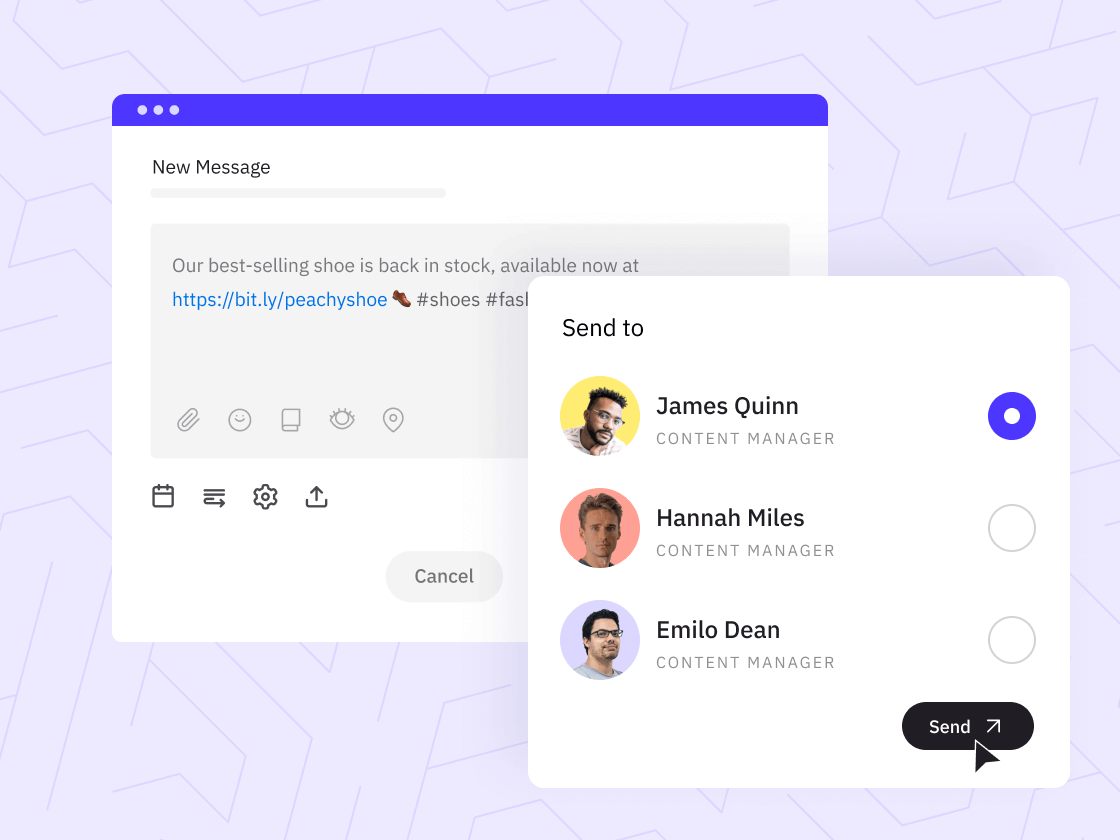

Besides scheduling posts and gathering analytics, agencies can easily and securely onboard clients into their dashboards without the hassle of sharing passwords. This ensures prompt feedback exchange that speeds up social media content creation and approvals.
Key features
- Content ideas. Generate content ideas with Sendible’s holiday calendar, automated RSS feeds, and Google Alerts, keeping your content relevant and timely.
- White-label reports. Create customizable, branded reports for your clients to showcase the key metrics and impact of your social media efforts.
- Direct scheduling. Schedule social posts directly to Facebook, Twitter, LinkedIn, Instagram, YouTube, and Google Business Profiles. Utilize bulk scheduling to streamline your content management.
Drawbacks: Unlike other social media tools, Sendible doesn’t support posting to TikTok.
Pricing: Sendible has four paid plans starting at $29/month.
7. Planable – best for in-app analytics tracking
As a social media tool, Planable provides a built-in analytics solution for tracking your performance on Facebook, LinkedIn, Instagram, and TikTok.
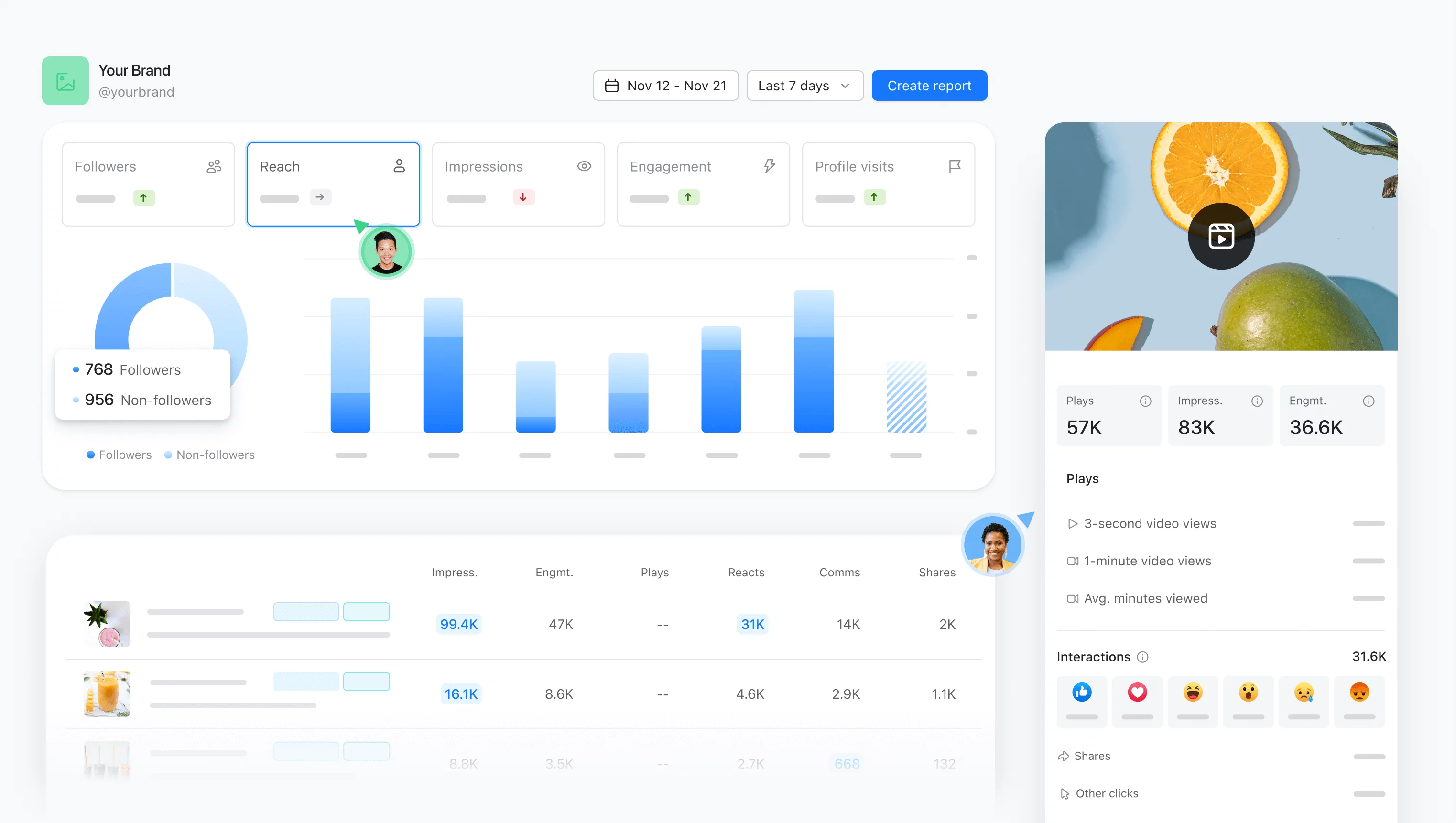

Social media analytics dashboard in Planable
You can track all your core metrics on account and post-level, identify top-performing posts, and get a pretty solid overall view of your social media efforts.
Key features
- Account statistics. Analyze your account’s performance over time, including such metrics as follower growth, reach, total engagements, and profile visits.
- In-depth post-level insights. Break down every piece of content to see how it’s performing individually, including data on engagement, video play length, impressions, reach, and other clicks.
- Digestible reports. Add the data you need and generate a customized, easy-to-read report. You can either download it and send the file to your clients or use a link to share it.
Drawbacks: Planable doesn’t yet provide analytics for all supported platforms (but it’s getting there).
Pricing: Planable Analytics is available in any paid plan as an add-on for $9/month.
8. Hootsuite – best analytics tool with listening features
Hootsuite is an all-in-one solution for managing your social media presence. Beyond scheduling and publishing content, Hootsuite offers detailed analytics to measure performance across multiple channels.
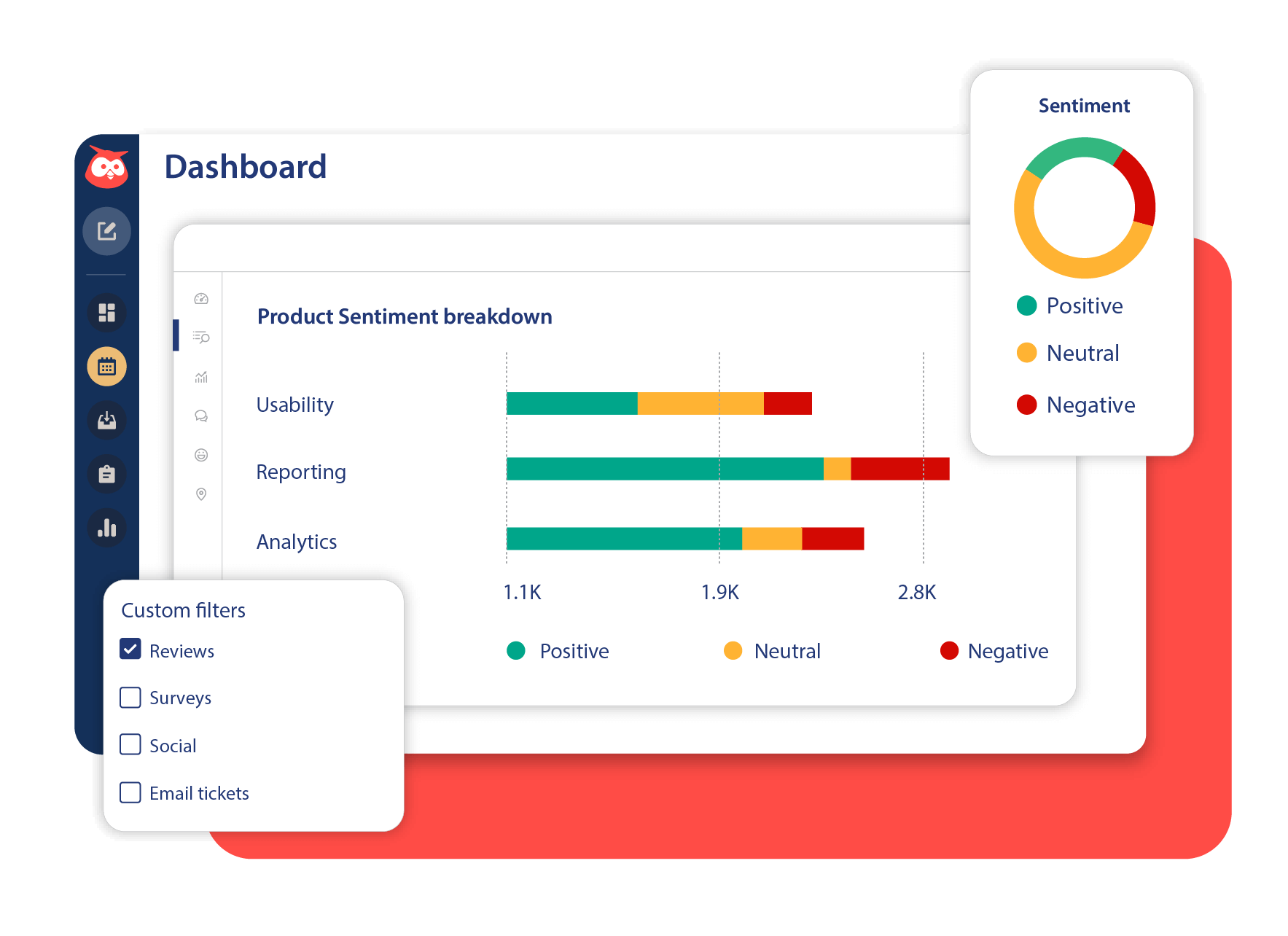

Its social listening features are particularly handy for tracking brand mentions and identifying upcoming trends online.
Key features
- Brand mentions and sentiment analysis. After acquiring Talkwalker, Hootsuite can now track brand mentions across 150 million websites and 30 social channels in multiple languages, in addition to its trend-identifying capabilities.
- Best time to publish. Gain insights on the optimal times to post content to maximize reach and engagement with your target audience.
- ROI report. Generate comprehensive reports to evaluate the return on investment of your social media campaigns, breaking down the impact and effectiveness of your strategies.
Drawbacks: Hootsuite lacks the collaboration features other social media tools have that can streamline workflows.
Pricing: Hootsuite has three paid plans starting at $99/month.
9. Sprout Social – best social media analytics tool for big companies
Sprout Social provides a huge suite of advanced social media analytics tools, perfect for large companies that need detailed insights to guide their content strategy (and have a budget for that).
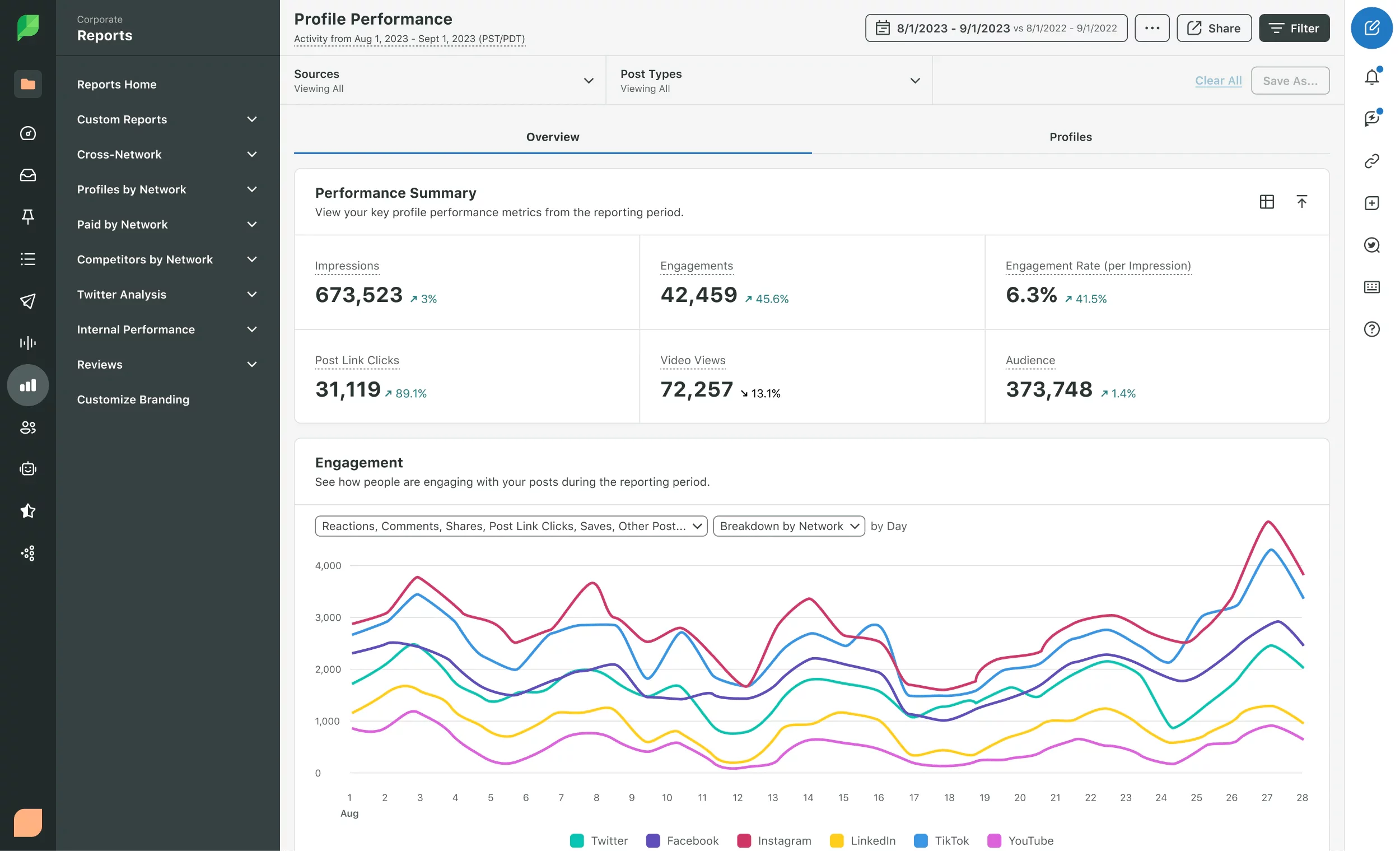

This social media management platform offers in-depth account and post analysis, allowing differentiation between organic and paid results for more precise reporting. It also includes ROI reports you can customize based on your client’s needs.
Key features
- Competitor analysis. Track and compare your social media performance against your competitors, identifying strengths and areas for improvement.
- Hashtag tracking. Monitor the performance of hashtags to understand their impact and optimize your hashtag strategy.
- Team reports. Analyze how efficiently your team handles requests, mentions, and interactions, helping you improve response times and overall engagement.
Drawbacks: Sprout Social is quite expensive compared to other social media tools.
Pricing: Sprout Social has four paid plans (plus add-ons), starting at $249/month.
10. Planable AI – best writing wingman
Do you ever feel stuck in front of a blank page? Or just tired of rewriting the same caption for all your social media accounts so it sounds unique? Planable AI is here to solve that.
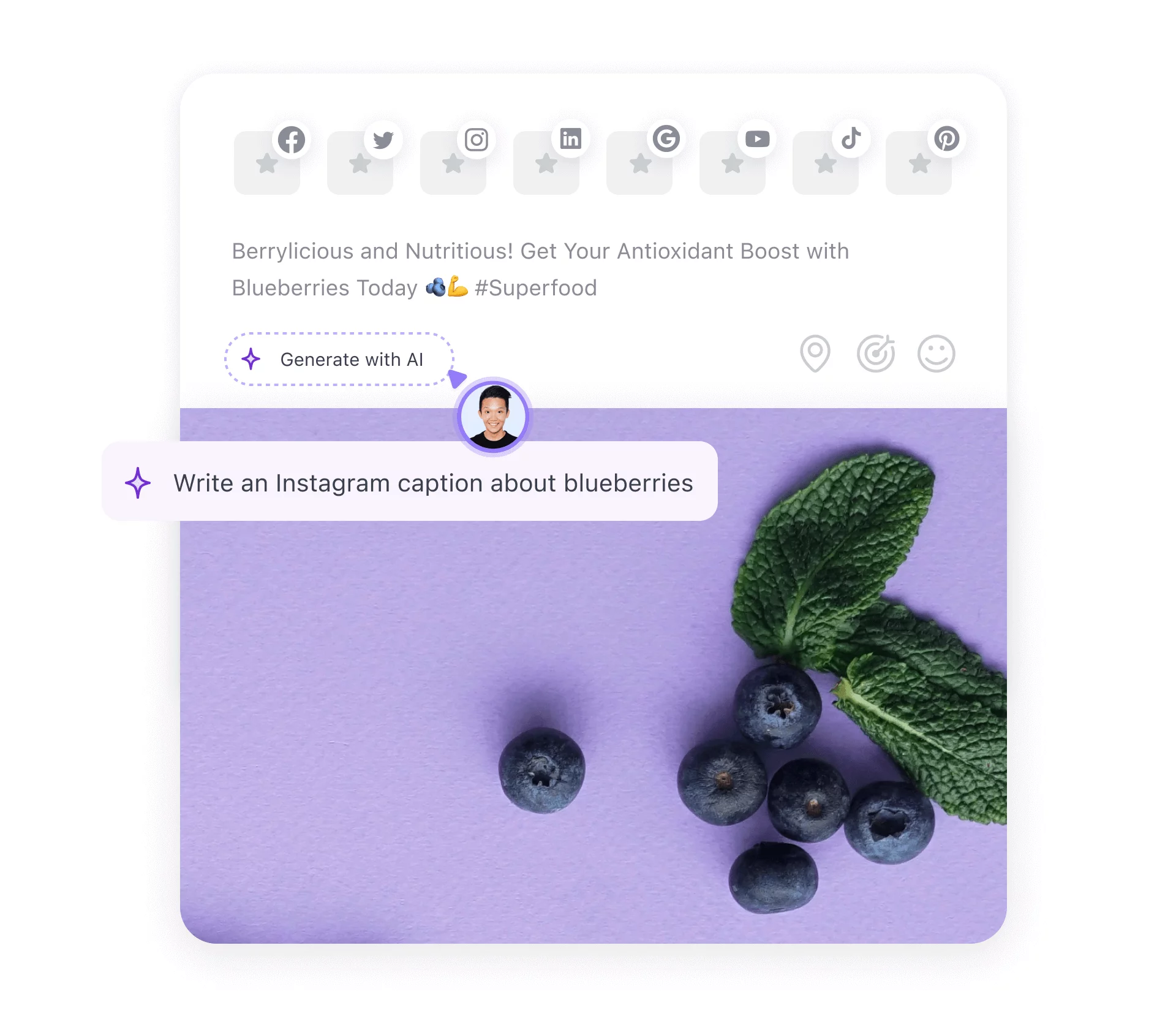

Instagram caption generation with Planable AI
Planable AI can help you generate social media captions tailored to different channels. You can make your text shorter, longer, bolder, or whatever you’d like to improve it.
Key features
- Generate captions for images. No idea what to write under your carousel post? Upload your pictures and ask AI to generate a catchy caption based on your visuals. Works with videos, too!
- Create text from scratch. Provide a brief description of your needs, and the AI will generate the content for you. Start a new post, click on Generate with AI, and specify what you’re looking for.
- Edit existing text. Choose from one of the pre-made prompts (make it shorter or longer, punchier, or rewrite in another tone of voice) or give Planable AI custom instructions to polish your text.
Drawbacks: Planable AI only works for creating text, not images or videos.
Pricing: Planable AI is included in all Planable plans alongside other social media tools within the platform. Try it for free for 50 posts and upgrade later for $11/month.
11. Emplifi – best for AI-powered social media management
Emplifi is a cutting-edge AI tool that enhances social media management through intelligent automation and data-driven insights.
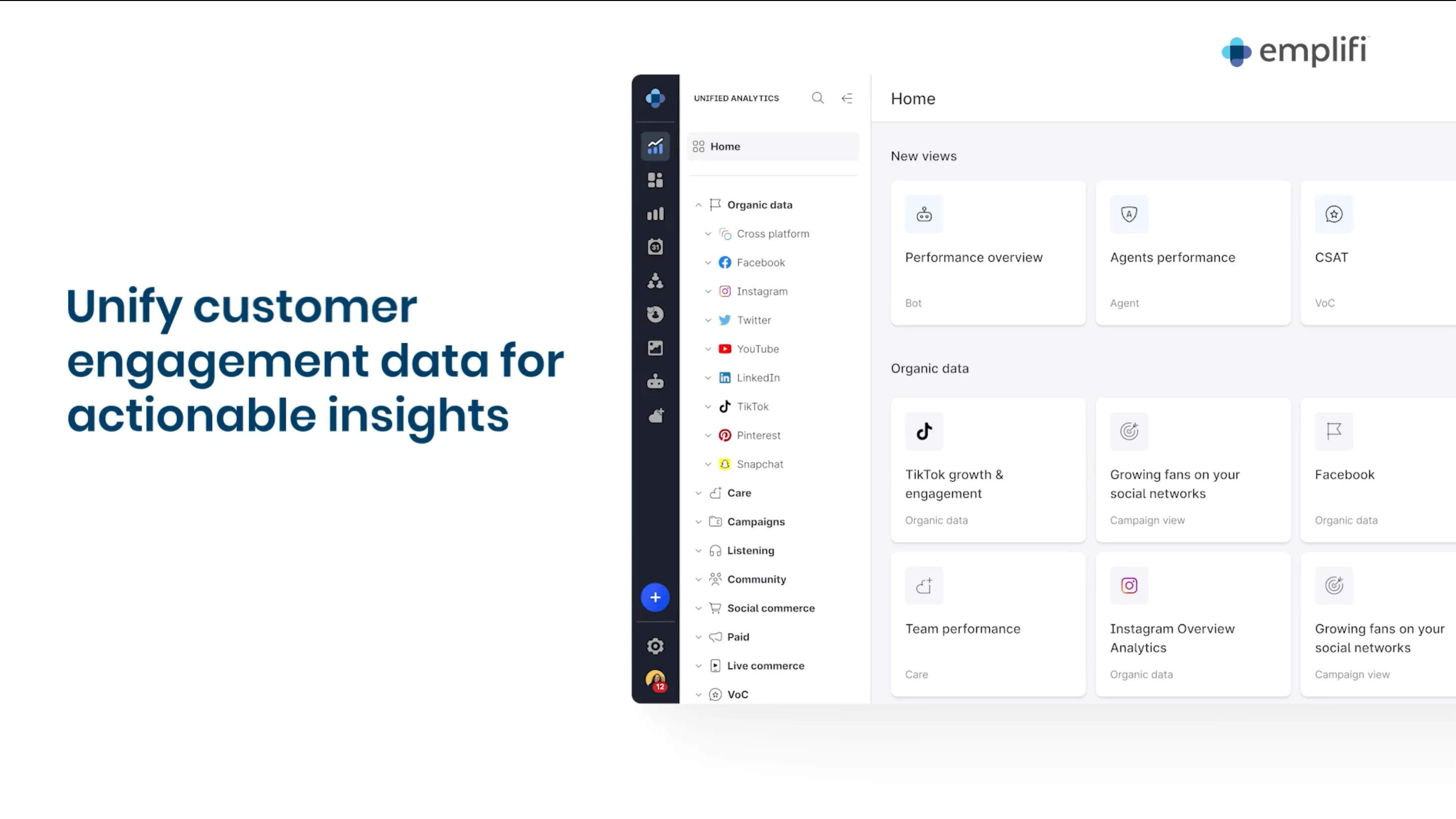

The platform helps teams streamline their social media marketing efforts, engage with their audience more effectively, and optimize their social strategy with AI insights derived from content performance.
Key features
- UGC management. Efficiently manage user-generated content to increase brand awareness and enhance engagement and authenticity with ultimate social proof.
- Emplifi AI Composer. Powered by OpenAI’s GPT-4 framework, this tool helps you generate tailored content at scale.
- Unified analytics. Emplifi provides detailed data on social media performance, including competitor research, omnichannel insights, customer data, and interactive data points, to refine your strategy.
Drawbacks: Emplifi lacks the listening capabilities or collaboration features other social media tools have. Some users also mention its “heavy” UX.
Pricing: Emplifi’s Social Marketing Cloud has four paid plans starting at $2400/year (or about $200/month).
Wrap Up
Managing social media can feel like a lot, but the right tools make it much easier, especially for small businesses. Platforms like Planable take the stress out of juggling content creation, scheduling, and team collaboration, helping you stay organized across multiple accounts. Tools like Canva make designing posts simple, and analytics platforms help you track what’s working.
If you want to use social media for a small business without feeling overwhelmed, there are tools that let you streamline everything and focus on growing your brand. You can try Planable for free to see how it simplifies your workflow.

